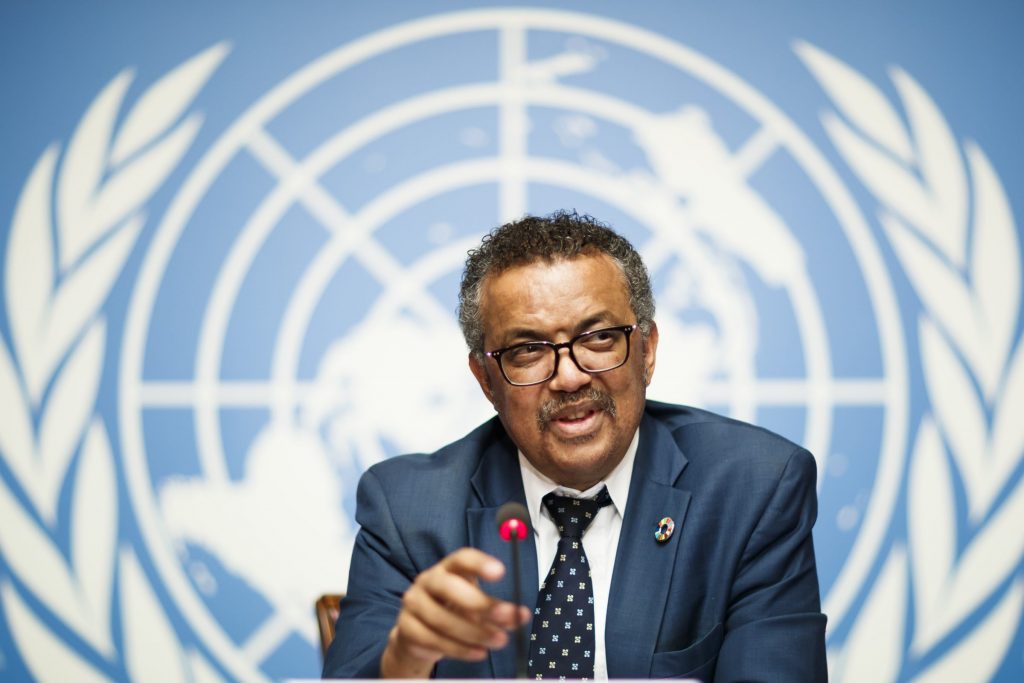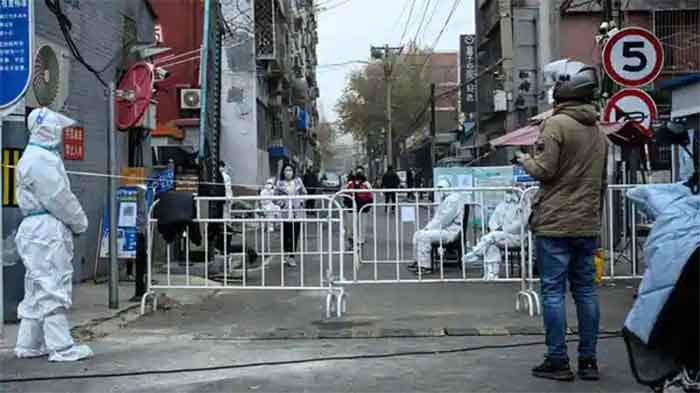
Using the coronavirus to score political points has only made the global health crisis worse, claimed the World Health Organization’s (WHO) director-general.
Some observers have interpreted the WHO chief’s claim as a broadside against U.S. President Donald Trump.
The politicization of the pandemic has “exacerbated” the effects of the disease, Tedros Adhanom Ghebreyesus said during an online conference on Monday, warning that the virus was still spreading.
He said that the pandemic is much more than a health crisis, it is an economic crisis, a social crisis and in many countries a political crisis. Its effects will be felt for decades to come.
Thee WHO chief didn’t get into specifics while speaking to the health ministers of the UAE, Sweden, and Norway during the virtual summit, but it appears many took his remarks as a not-so-subtle slight against Trump.
Trump announced at the end of May that he would cut ties with the WHO, accusing the organization of doing China’s bidding and failing to enact reforms following the outbreak of Covid-19.
The US president claims that China pressured the WHO to mislead the world about the coronavirus after the first outbreak was detected in Wuhan in December.
Washington’s decision to pull its funding from WHO was condemned by China and even prompted US ally Germany to express concern about the potential “backlash” it would have on international health.
The WHO DG’s comments could mark a widening rift between his organization and the US. The WHO chief had previously praised Washington’s “immense” contribution to global health and called for cooperation despite Trump’s move to quit the UN body.
There have been nearly nine million Covid-19 cases registered worldwide since December, resulting in around 468,000 deaths, according to a tally maintained by Johns Hopkins University. Some countries, such as South Korea, have reimposed measures to stop the spread of coronavirus following a second wave in new cases.
العربية中文françaisрусскийespañWHO DG’s opening remarks at the media briefing on June 22, 2020
It seems that almost every day we reach a new and grim record.
Yesterday, more than 183,000 new cases of COVID-19 were reported to WHO – easily the most in a single day so far.
More than 8.8 million cases have now been reported to WHO, and more than 465,000 people have lost their lives.
Some countries are continuing to see a rapid increase in cases and deaths.
Some countries that have successfully suppressed transmission are now seeing an upswing in cases as they reopen their societies and economies.
A delicate balance
All countries are facing a delicate balance, between protecting their people, while minimizing the social and economic damage.
It’s not a choice between lives and livelihoods. Countries can do both.
We urge countries to be careful and creative in finding solutions that enable people to stay safe while getting on with their lives.
We continue to urge all countries to double down on the fundamental public health measures that we know work.
Finding and testing suspected cases works.
Isolating and caring for the sick works.
Tracing and quarantining contacts works.
And protecting health workers works.
At the same time, these measures can only be effective if each and every individual takes the measures that we also know work to protect themselves and others.
Maintain physical distance.
Continue cleaning your hands.
And wear a mask where appropriate.
Just as we do the things that we know work to prevent the spread of the disease, we are also learning more about how to treat the sick.
Equitable distribution of dexamethasone
Although the data are still preliminary, the recent finding that the steroid dexamethasone has life-saving potential for critically ill COVID-19 patients gave us a much-needed reason to celebrate.
The next challenge is to increase production and rapidly and equitably distribute dexamethasone worldwide, focusing on where it is needed most.
Demand has already surged, following the UK trial results showing dexamethasone’s clear benefit.
Fortunately, this is an inexpensive medicine and there are many dexamethasone manufacturers worldwide, who we are confident can accelerate production.
Guided by solidarity, countries must work together to ensure supplies are prioritized for countries where there are large numbers of critically ill patients, and that supplies remain available to treat other diseases for which it is needed.
Transparency and constant monitoring will be key to ensuring needs dictate supplies, rather than means.
Guarantee quality
It is also important to check that suppliers can guarantee quality, as there is a high risk of substandard or falsified products entering the market.
WHO emphasizes that dexamethasone should only be used for patients with severe or critical disease, under close clinical supervision.
There is no evidence this drug works for patients with mild disease or as a preventative measure, and it could cause harm.
WHO is also continuing to support countries with essential supplies of personal protective equipment and laboratory diagnostics.
Supply Portal
One way we are doing that is through the COVID-19 Supply Portal, an online platform through which countries that need supplies can enter requests.
So far, 48 countries have made requests for supplies, with a value of US$92 million.
WHO is currently in the process of shipping more than 140 million items of personal protective equipment to 135 countries, 14,000 oxygen concentrators and millions of tests.
Meanwhile, WHO is also working with countries to maintain essential health services.
WHO recently surveyed countries to assess the impact of the pandemic on essential health services.
Disruption
Of the 82 countries that have responded so far, more than half have limited or suspended at least one service delivery platform, such as outpatient or inpatient services, or community-based care.
Almost three quarters of countries reported that dental and rehabilitation services have been partially or completely disrupted.
Around two-thirds of countries reported disruptions to routine immunization, diagnosis and treatment for noncommunicable diseases and family planning and contraception.
More than half of countries reported disruptions for mental health disorders, antenatal care, cancer diagnosis and treatment, and services for sick children.
Countries are using a variety of strategies to deal with these disruptions, including triage, telemedicine and redirecting patients to alternative health facilities.
Still, the consequences of these disruptions will be felt for many years to come.
Health is not a luxury item
The world is learning the hard way that health is not a luxury item; it is the cornerstone of security, stability and prosperity.
That is why it is essential that countries not only respond urgently to the pandemic, but also that they invest in strong health systems domestically, and in global health security.
Last year, world leaders came together at the United Nations General Assembly in New York to adopt a landmark political declaration on universal health coverage.
Now more than ever, all countries must make universal health coverage a priority.
It is not a question of whether countries can afford to do this, it is a question of whether they can afford not to.
SIGN UP FOR COUNTERCURRENTS DAILY NEWSLETTER















































